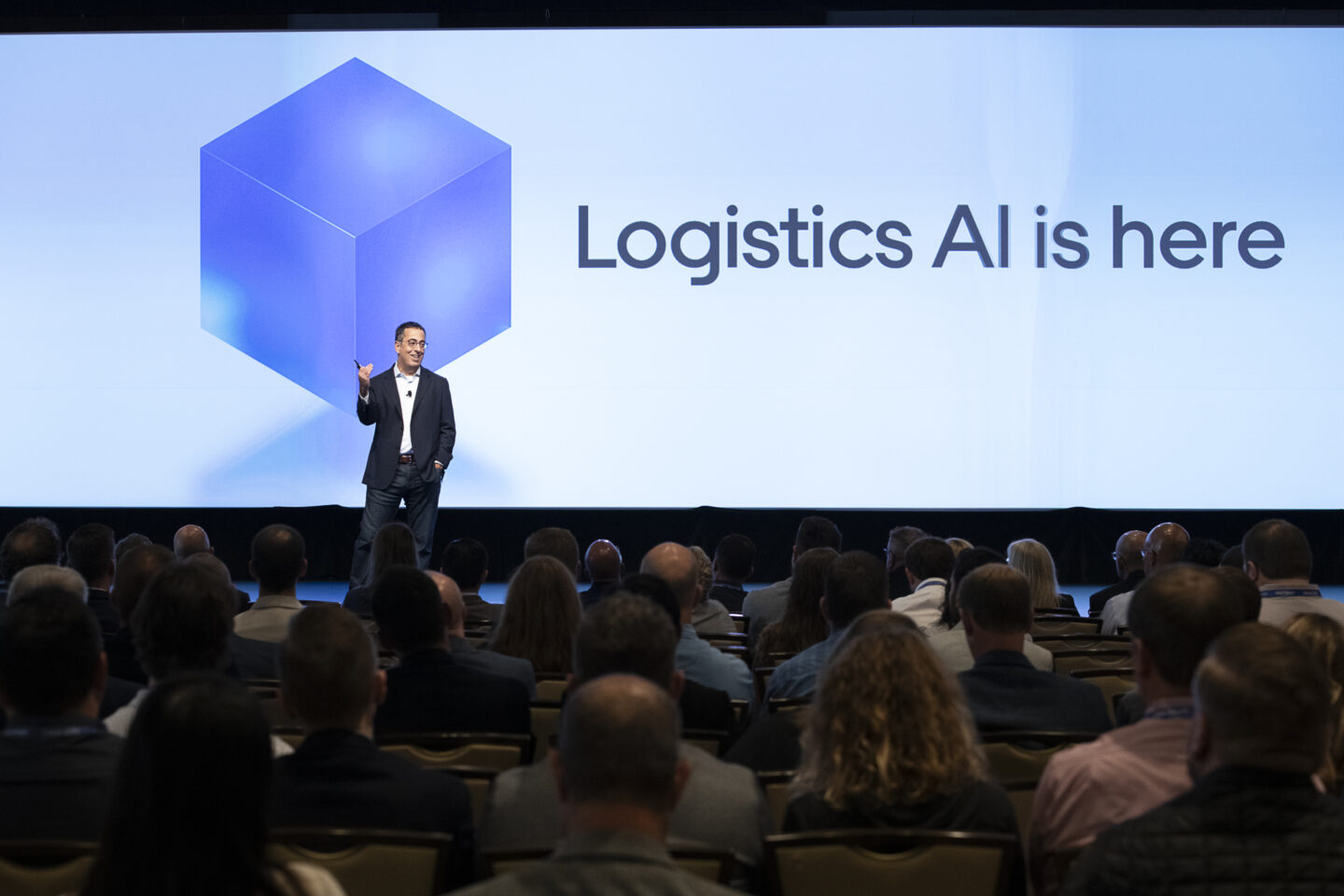CEO Lior Ron on AI’s evolution—and future possibilities

Uber Freight founder and CEO Lior Ron has been experimenting with artificial intelligence since its “dark ages.”
Growing up in Israel in the ‘80s, he spent his childhood learning to program when personal computers were just starting to take off. His parents bought him an Atari at the age of nine. As a teen, he took classes at Technion—Israel’s Institute of Technology—where he and his classmates inserted AI models into games like checkers and backgammon.
“I was hooked at a very young age,” he says, “just a kid wanting to explore and to play some games.”
And indeed, driving innovation with AI is a defining characteristic of Lior’s career—from studying at Technion and Stanford, to his work as product lead for Google Maps, and as co-founder of self-driving truck company Otto (which was acquired by Uber). Now, at the helm of our team here at Uber Freight, he’s taking on perhaps his greatest AI-related challenge yet: infusing AI into the supply chain, across the logistics industry.
Below, Lior shared some of his formative experiences with AI and how they inform the way he’s using it to innovate the freight industry.
Ahead of the session, Lior shared some of his formative experiences with AI and how they inform the way he’s using it to innovate the freight industry.
Can you tell us a little bit about what sparked your interest in AI?
I think like many of our pursuits, I just started as a kid that was looking for fun stuff to do. Growing up in Israel, in proximity to Technion, I was able to pick up programming and experience all the exciting stuff computers can do and let my imagination roam as those capabilities keep growing. I programmed games and accounting programs for my mom’s office and many other things.
Were your parents supportive of your interest in AI? You mentioned you programmed some software for your mom—were they tech-savvy, too, or were you leading the technology adoption charge in your household?
I was leading the charge. My parents are both self-made. My mother is an entrepreneur, and one of the first ones to implement any computer system in her office in Israel. My father was an industrial engineer, and one of the first to adopt any computerized system to run a production line in logistics, actually. So they were always willing to explore and keep a curious mind, which I think is the key for any new technology. Just keep a curious mind and experiment—that’s what made them encourage me to explore that and gave me some of those early opportunities.
When you entered university, you decided to study neural networks. What was the driving force behind your interest at that phase, since AI was, as you’ve said, still in its “dark ages”?
Neural networks were a very powerful tool at the time, but they were used for very high-end, intensive applications—launching shuttles and navigating robots on the moon. I was always striving to come up with practical, consumer-level applications, going back to games and the fun and discovering that as a kid. I started writing papers on neural networks and how to scale them. The practical application ended up being building a neural network that mimics a bit of how the brain processes visual information, which has been used to help Parkinson’s patients walk better. That was my Master’s thesis, and also became my first startup after Andy Grove, the late Intel chairman and founder, and a Parkinsonian himself, made me promise him on the spot that I was going to do anything I could to commercialize that invention.
I was really fortunate because I didn’t have the initial idea—my professor at Technion did—and then it wouldn’t have been a startup without Andy Grove being my professor. But I was hooked. We took theoretical AI research and turned it into an invention that helps people.
Your next foray into AI was at Google—how did you land there? What did you learn about AI development while you were there?
For my second startup, I was planning to build a search engine for geo-information and discussed the idea with another professor at Stanford, Eric Schmidt. Eric introduced me to the Google team, who convinced me that we were better off building the search engine in Google versus the outside, so that’s how I ended up being fortunate enough to join Google Maps at a very early stage when Google Maps had around two million users in just the U.S. and UK. I ended up heading Google Maps and, over the course of five years, we scaled to over a billion users.
Besides an amazing journey with an amazing talent, it was also a prime example of being able to apply AI to a bunch of cutting-edge challenges. One example of our mission there was to create a digital version of the physical world. To do that, you need to use a lot of data and a lot of sensors and then you need to make sense of it all. So at Google Maps we used AI to crawl information, to do data fusion to understand what are the places and all the details on those places and combine those to actually have all the results that you like when you’re searching in Google Maps. You can see the analogies to logistics in Uber Freight, which is creating a digital mirror of a physical supply chain.
When did you start turning to logistics and thinking about ways to apply AI to this industry?
Seven years ago, I was looking for where I’m going to spend the next decade or few decades of my life, and I had very simple criteria. I wanted to go to a place where I could have an impact as a technologist, so to an industry that hasn’t been transformed yet by technology. The other thing that I think motivates all of us is to make an impact. So I asked myself, ‘What’s an industry that has an impact on society, a pain point or use case that has broad societal value?’ And that led me to logistics.
I didn’t know anything about logistics, except a bit of what my father was up to growing up. I found, now what we take as a given, this amazing industry is driving the economy but still running on fax, phone, and paper.
How have you approached integrating AI into the Uber Freight business?
We think about it in three phases—and I saw these phases at Google. The first phase is you take a physical universe and you map it digitally. You digitize, you connect the pieces, you create the infrastructure, which is essentially I would say Uber Freight 1.0. We’re still in the early epoch of that, it’s a huge task.
Phase two is you can start empowering decision-making now that everything is connected. We are aiding, with the information we’ve collected, better and better and better decision-making, whether it’s our own operators or shippers or customers. We’ve been doing that for the past couple of years. AI allows you to accelerate that. What we’ve launched, the first step of Insights AI, is a bit of that.
The third step is making proactive recommendations based on the data. The human stays in control, but it’s about augmenting them and about the models proactively suggesting new directions, new recommendations, new decisions, new optimizations. We’re starting to explore that frontier for Uber Freight.
What defines how you and your team leverage AI and develop the models for the logistics industry?
For generative AI, and all the amazing stuff we see from ChatGPT and others to work, you need data and you need the web. We created, in the past seven years, the logistics web. We have now $18 billion of freight under management, one of the biggest networks in the U.S. We have tens of thousands of shippers, and around a hundred thousand carriers. We are connected to all of them digitally. We power some of the biggest supply chains in the U.S. and worldwide, so we can train those models on our logistics web and we can then apply those insights to help optimize the entire equation.
I think what makes Uber Freight special is the ability, from day one, to combine this amazing technology talent and those engineers and those model developers with the fantastic logistics experts and have them interact with each other. I think that’s what drives the best results.
How does your experience with AI impact how you approach the CEO role, compared to someone without a technical background?
First of all, it just gives me more confidence to lean into the future, in the potential of AI. Organizationally, we lean into AI faster and set the right culture, both on the leadership team and across the company, to be able to leverage AI opportunities. We need to provide some top down direction, but we give permission to the organization to embrace this new era and to experiment with all those tools and give the time and space to do that.
You mentioned being confident in the future. At Deliver, for example, you spoke about the potential to scale self-driving trucks in just a few years. What does the future of logistics technology look like further out—say, 10 or 20 years down the road?
At the end of the day, this is an optimization problem. I think we’ll have more and more of a logistics autopilot where logistics professionals can define the constraints and define what they’re trying to solve, and the machine can take over everything else: Procurement outcome, supply chain planning and network planning, risk mitigation, cost savings, carrier selection, schedules, dock management, all of that stuff. If we build the right digital infrastructure, then a lot of that can happen in an automated way with the right interface, the right checkpoints, and then allow those supply chain professionals to elevate their game and be even more strategic and be even more focused on the task at hand.
Again, making an impact is really important to me and I see the opportunity for this to drive impact for all stakeholders in the supply chain: It will enable carriers to optimize their schedule better; empower logistics professionals to make better decisions; allow small business to enjoy the logistics expertise of a big one; and even lower the cost of goods for the end consumer.
Lior and Uber Freight are leveraging AI to transform logistics. Learn more about our Insights AI product, or read the latest from our engineering team about building high-quality algorithms to power an AI-enabled future.


